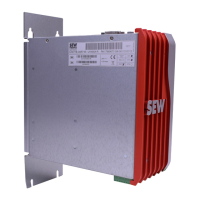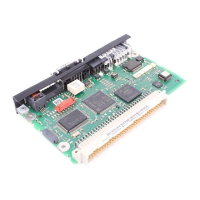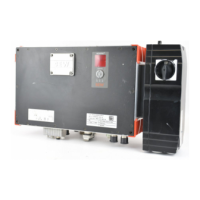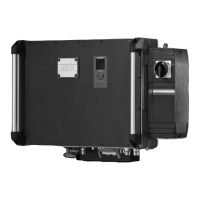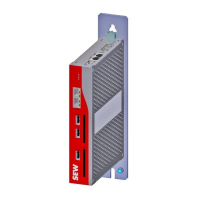
Do you have a question about the SEW-Eurodrive MOVI-C CONTROLLER UHX65A and is the answer not in the manual?
| Type | Controller |
|---|---|
| Series | MOVI-C |
| Frequency Range | 50/60 Hz |
| Protection Class | IP20 |
| Control Modes | Speed control, Torque control, Position control |
| Control Method | Field-oriented control |
| Communication Interfaces | CANopen, PROFIBUS, Ethernet |
| Mounting Type | Wall mounting |
| Input Voltage (AC) | 380 - 500 V |
| Ambient Temperature | 0-40 °C |
Provides an overview of the manual's content and purpose.
Explains the different types of safety notes and signal words used.
Lists product names and trademarks mentioned in the documentation.
Introduces the purpose of general safety notes for preventing injury and damage.
User responsibilities for safety compliance and qualified personnel.
Defines qualified specialists for mechanical and electrotechnical work.
Specifies intended application in electrical plants or machines.
Product must not perform safety functions without a higher-level system.
Ensures proper installation and cooling, protecting from mechanical strain.
Ensures covers are attached and preventive measures comply with regulations.
Advises on preventing unauthorized access to networked systems.
Lists topics covered in the manual, e.g., installation and interfaces.
Recommends other SEW-EURODRIVE manuals for configuration.
Describes controller function and performance class.
Shows example of controller nameplate with key information.
Lists available controller variants and fieldbus interfaces.
Details controller's Ethernet, EtherCAT®/SBusPLUS, and USB interfaces.
Details X80, X82 Ethernet interfaces for the control section.
Lists devices connectable via the EtherCAT®/SBusPLUS interface.
Explains VNET usage with the Windows OS.
Explains OMH CFast card role in firmware and user data.
Describes OMW CFast card for Windows OS and visualization.
Lists accessories that can be ordered by part number.
Details 4-pole system bus cable for component connection.
Provides instructions for mechanical installation of the controller.
Specifies clearance and mounting for proper cooling.
Covers requirements for protective separation in electrical installations.
Guidance on minimizing electrical interference from bus cables.
Details functions of various terminals and interfaces on the controller.
Specifies required DC 24 V power supply unit and cable length.
How to connect controller to Ethernet network using specific cables.
Describes VNET for addressing the control section.
Steps to set network address for the Windows section.
How to set IP address for Windows section via adapter options.
Confirms IP address and subnet mask settings for Windows section.
Explains connections via VNET or external network.
How to find software package version via Windows settings.
Controller as EtherCAT®/SBusPLUS master for inverters.
Use of USB interfaces for connecting peripherals.
Use of DisplayPort for connecting a monitor.
Instructions for inserting OMH and OMW CFast memory cards.
Installation of optional components and accessories.
Process of installing cable retainers for cable management.
Routing cables to retainer and securing with ties.
Detailed table of terminal assignments and functions.
Identifies and describes status LEDs on the controller's front panel.
Meaning and status of Link/Activity and Speed LEDs.
Status of the 24V voltage supply LED.
Firmware status during boot and operation.
Outlines configuring EtherCAT®/SBusPLUS stations.
Guides on setting up network connection between PC and controller.
How to perform network scan using MOVISUITE® software.
How to add scanned devices to a MOVISUITE® project.
Switching views and naming controller in MOVISUITE®.
Saving MOVISUITE® project and controller device name.
Initial information about Windows 10 IoT Enterprise OS.
First-time setup process for Windows OS.
Distinct switch-off and reboot behavior of the controller.
Recommends backup of OMW CFast memory card.
Introduces typical application cases for the Windows section.
Guides on establishing remote desktop connection for maintenance.
Selecting remote assistance and desktop options in system properties.
Use of on-screen keyboard with touchscreen monitors.
Simulating right click using on-screen keyboard.
Activating swap file for workloads and its deactivation.
Accessing performance options and virtual memory settings.
Setting system managed size for the swap file.
Configuring system to boot automatically after startup.
Instructions for replacing a MOVI-C® CONTROLLER.
Process of exporting firmware image using MOVISUITE®.
Copying firmware and licenses to OMH memory card.
Proper disposal of product and components according to regulations.
General technical specifications and environmental conditions.
Detailed specs for electrical supply, memory, and interfaces.
Ports and functions for engineering and Windows interfaces.
External dimensions and connector layout of the controller.
Dimensions and mounting of accessories for cable routing.
